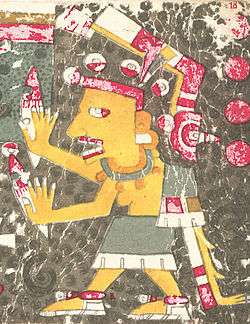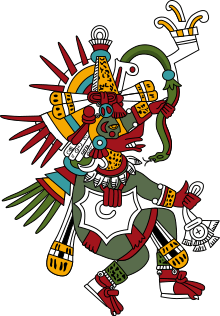Mictēcacihuātl

Mictēcacihuātl as depicted in the Codex Borgia
In Aztec mythology, Mictēcacihuātl (Nahuatl pronunciation: [mik.teː.ka.ˈsí.waːt͡ɬ], literally "Lady of the Dead") is Queen of Mictlān, the underworld, ruling over the afterlife with Mictlāntēcutli, another deity who is her husband.[1]
Her role is to watch over the bones of the dead and preside over the ancient festivals of the dead. These festivals evolved from Aztec traditions into the modern Day of the Dead after synthesis with Spanish traditions. She now presides over the contemporary festival as well. She is known as the "Lady of the Dead", since it is believed that she was born, then sacrificed as an infant. Mictēcacihuātl was represented with a flayed body and with jaw agape to swallow the stars during the day.[2]
Notes
See also
References
- Fernández, Adela (1996) [1992]. Dioses Prehispánicos de México [Prehispanic Gods of Mexico] (in Spanish). Mexico City: Panorama Editorial. ISBN 968-38-0306-7. OCLC 28801551.
- Miller, Mary; Karl Taube (1993). An Illustrated Dictionary of the Gods and Symbols of Ancient Mexico and the Maya. London: Thames & Hudson. ISBN 0-500-27928-4. OCLC 59601185.
This article is issued from
Wikipedia.
The text is licensed under Creative Commons - Attribution - Sharealike.
Additional terms may apply for the media files.
